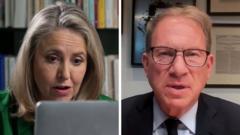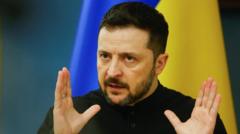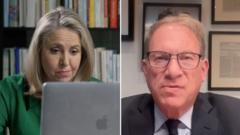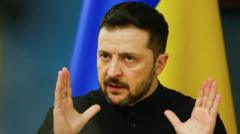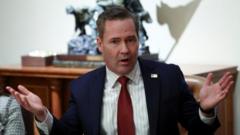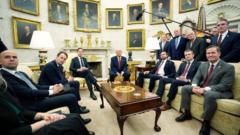The Trump administration has resumed deportation flights to Venezuela, following an agreement between the US and Venezuelan governments, which had previously stopped due to diplomatic tensions and sanctions. Venezuelan officials, including President Nicolás Maduro, framed the repatriation as a humanitarian act, while the US labeled the deportees as "illegal aliens."
US-Venezuela Deportation Flights Resume Amid Diplomatic Tensions

US-Venezuela Deportation Flights Resume Amid Diplomatic Tensions
A flight carrying 199 Venezuelans deported from the US landed in Caracas after a temporary halt linked to diplomatic disputes over oil sanctions.
A flight carrying 199 Venezuelans deported from the United States touched down early Monday at Simón Bolívar airport in Caracas. These repatriation flights had been stalled for several weeks following the Trump administration’s withdrawal of a license allowing Venezuela to export oil to the US amid ongoing sanctions, which complicated diplomatic communications between the two nations.
However, an agreement reached over the weekend allowed for the resumption of deportation flights as part of Trump’s aggressive immigration policy aimed at tackling undocumented migrants in the US. Venezuelan President Nicolás Maduro welcomed the return of the deportees, describing it as an opportunity to "rescue and free migrants from prisons in the US."
Upon arrival in Caracas, many deportees expressed relief by raising their arms in celebration. Their journey had included being transferred from Texas to Honduras, where they boarded a Venezuelan airline flight back to their homeland. The US Bureau of Western Hemisphere Affairs categorized these individuals as “illegal aliens,” asserting they had no legal grounds to remain in the country.
Contrastingly, Jorge Rodríguez, head of Venezuela's National Assembly, asserted that migration should not be criminalized. This dichotomy reflects the broader sensitivities surrounding migration between the two countries.
Initially, an agreement allowing the deportation of Venezuelans from the US was reached in January through Trump’s special envoy Richard Grenell, viewed as a foreign policy success by the Trump administration. However, tensions escalated when Maduro publicly criticized the US for restricting Chevron's operations in Venezuela, a move he claimed undermined communication channels essential for the repatriation process.
In an additional incident, the Trump administration recently deported 238 Venezuelans to a prison in El Salvador, claiming their association with a criminal gang, a statement met with public outcry in Venezuela as families of the deported contended their loved ones were innocent.
The situation intensified when US Secretary of State Marco Rubio issued a stark warning on social media that Venezuela would face “severe and escalating” sanctions should it refuse the return of its citizens. In response, Maduro indicated a renewed commitment to facilitating the return of detained migrants, signaling ongoing complexity in US-Venezuela relations.


